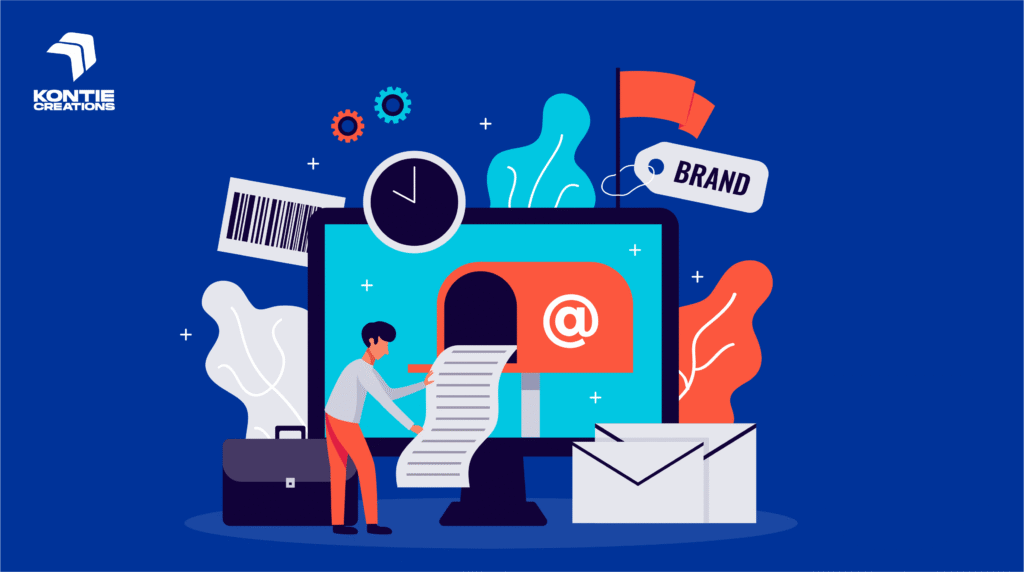Email Marketing Explained: How to Drive Revenue and Retain Customers
In today’s fast-paced digital landscape, trends come and go, but email marketing remains a consistent, high-ROI strategy for businesses of all sizes. It’s not just about sending emails; it is about building lasting relationships, boosting brand visibility, and driving measurable results. Are you a small business owner or leading a multinational brand? Mastering email marketing can give you an unbeatable edge. In this blog post, Kontiecreations makes some insightful and interesting revelations about Email Marketing. Walk with us. Types of Businesses That Should Use Email Marketing The beauty of email marketing is its versatility; it can be tailored for virtually any and every industry. Below are some examples of businesses that benefit the most: Hotels & Hospitality – Share seasonal offers, event invitations, updates on facility updates, and personalized booking reminders to enhance customer experiences. E-commerce Stores – Launch product announcements, flash sales, and cart recovery emails. Real Estate Agencies – Provide property listings, market insights, and follow up with buyers. Restaurants & Cafés – Send menu updates, loyalty discounts, and event promotions. Educational Institutions – Announce admissions, share newsletters, and promote courses. Healthcare Providers – Deliver appointment reminders, wellness tips, and follow-up care messages. Nonprofits & NGOs – Run fundraising campaigns, share impact stories, and update donors. Corporate Service Providers – Send thought leadership content, case studies, and client onboarding sequences. Event Planners – Announce upcoming events, send ticket offers, and share post-event highlights. If your business has customers, prospects, or supporters, email marketing can be your direct line to them. Types of Email Clients An email client is the platform or software your audience uses to read and manage their emails. Understanding this helps ensure your designs display perfectly. Web-Based Email Clients Gmail: Commands around 30.7% of email client market share. With over 1.8 billion active users globally as of 2024–2025. Rough estimate: 1.8 billion Gmail users. Yahoo Mail: Represents around 2.64% of email client usage. Has approximately 225 million active users as a service. Outlook.com: 400 million Zoho Mail: 10 million users Desktop Email Clients Microsoft Outlook: As an email client (desktop/web): ~4.38% market share. As a provider (Outlook.com, formerly Hotmail): ~500 million users Apple Mail: Holds approximately 53.67% of the global email client market share as of September 2024. With an estimate of about 4.48 billion email users worldwide, this suggests that around 2.4 billion actively use Apple Mail Mozilla Thunderbird Mobile Email Clients Gmail App Outlook Mobile Apple Mail App Privacy-Focused Clients ProtonMail Tutanota Importance of Email Marketing for Businesses of All Sizes Direct Access to Customers – You bypass algorithms and reach people in their inboxes. Cost-Effective Marketing – Lower cost compared to TV, print, or most digital ads. Scalable Personalization – Segment audiences for highly relevant communication. Measurable Results – Track open rates, click-through rates, and conversions. Retention and Loyalty – Keep your brand fresh in customers’ minds through consistent engagement. Automated Efficiency – Utilize email automation for onboarding, follow-ups, and lead nurturing, eliminating the need for constant manual work. Benefits of Email Marketing to Businesses Higher Engagement – Personalized emails can deliver up to 6x higher transaction rates. Stronger Customer Relationships – Regular updates keep your audience connected. Increased Sales Opportunities – Seasonal promotions and upselling emails boost revenue. Brand Authority – Consistent, valuable content builds trust and expertise. Lead Nurturing – Email keeps leads engaged until they’re ready to buy. Things to Avoid in Email Marketing Sending Too Many Emails – This can annoy subscribers and lead to unsubscribes. Clickbait Subject Lines – Short-term curiosity kills long-term trust. Weak or Missing Call-to-Action (CTA) – Every email should have a clear goal. Ignoring Mobile Users – Over 50% of emails are opened on smartphones—design for small screens. Neglecting Legal Compliance – Follow GDPR, CAN-SPAM, and other email regulations. Overly Generic Content – Personalization is key to engagement. Analyzing the ROI of Email Marketing One of the most compelling reasons to invest in email marketing is its incredible return on investment. Average ROI: According to multiple industry studies, email marketing delivers $36–$42 for every $1 spent. Why the ROI is so High: Low distribution cost (sending thousands of emails costs a fraction of ad spend). Higher conversion rates from personalized offers. Long-term engagement without repeated ad fees. Example ROI Breakdown: Monthly email marketing cost (tools + design): $500 Revenue generated from campaigns: $15,000 ROI = (15,000 – 500) ÷ 500 × 100 = 2,900% For comparison, paid ads often deliver 200–400% ROI—making email one of the most cost-efficient marketing tools available. Email marketing is more than a communication channel; it’s a growth engine for any business. When executed with strategy and creativity, it drives measurable results, builds customer loyalty, and delivers exceptional ROI. Ready to start your Email Marketing journey? At Kontie Creations, we don’t just send emails, we craft powerful, data-driven campaigns that connect with your audience and grow your brand. 📩 Contact us today for a comprehensive and strategic email & digital marketing solution that turns subscribers into loyal customers and loyal customers into brand advocates.
Email Marketing Explained: How to Drive Revenue and Retain Customers Read More »



